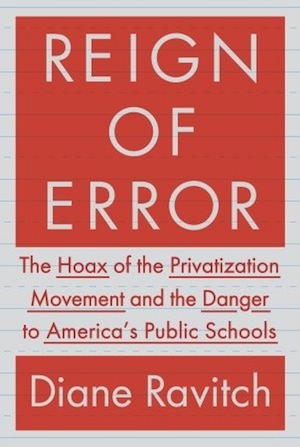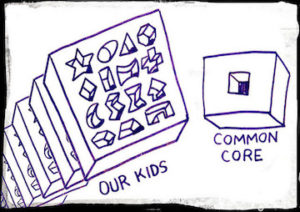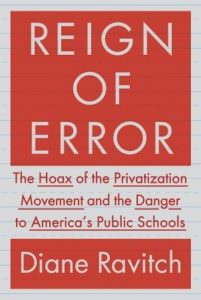|
To see long excerpts from “Reign of Error” at Google Books, click here.
|
“Reign of Error: The Hoax of the Privatization Movement and the Danger to America’s Public Schools”
A book by Diane Ravitch
As I write, historian Diane Ravitch is simultaneously the most feared and revered figure in American education. To the corporate education reformers, a group Ravitch has come to identify as privatizers of our public schools, she is a colossal and authoritative thorn in the side. Composed of billionaires Bill Gates, Eli Broad, members of the Walton family of Walmart fame, more hedge fund managers than can be named, and the most powerful political figures in the country including Barack Obama, these are people who are very used to getting their way. And get their way they have: For the past 10 years the privatizers have utterly dominated educational discourse, successfully forging untested and radical changes upon the system, using their virtually unlimited wealth to purchase anything and anyone who stood in their way while funding front groups by the dozens to block the way of others.
But Ravitch is a conscience that can’t be purchased. She is also an apostate. While serving as U.S. assistant secretary of education under George H.W. Bush, Ravitch was a proponent of standardized testing and “accountability,” which constitutes the base of much education reform. But in time Ravitch did something unique in the Brave New World of education: She looked for evidence of success in the various reform policies and found fraud and failure. This led her to a period of radical reconsideration.
Then Ravitch did something extremely courageous and rare: She publicly admitted she had made errors in judgment. Even more, she concluded that some of the policies she had championed were actually harmful.
To the privatizers, Ravitch represents the authority and integrity they are quietly and desperately trying to discredit or purge altogether.
To reformers, Ravitch remains more than a problem. As the reforms themselves grow ever more strident, standardized and, yes, totalitarian in structure, Ravitch embodies the institutional memory that no totalitarian system can abide.
This is but one of the reasons that Ravitch has become so revered by teachers who bear the brunt of the reforms. Teachers bear witness to what the reforms are doing to their profession and to the students in their charge. For teachers, politically orphaned, Ravitch is a crusader who has done what their politicians, and, sadly, even their unions, have refused to do. She has spoken truth to power to the richest people and the most powerful political figures in the United States who have aligned themselves with the ruthless drive to privatize our schools, the most vital public trust in this nation.
Ravitch has written 10 books on education. Her new book is “Reign of Error: The Hoax of the Privatization Movement and the Danger to America’s Public Schools.” It continues where her 2010 book, “The Death and Life of the Great American School System: How Testing and Choice Are Undermining Education” left off, and takes to pieces the myriad “reforms” that have been instituted since that work was published.
“Reign of Error” is encyclopedic in scope. There is no aspect of educational reform that Ravitch does not discuss. It is not an overtly political work, even as it provides ample facts on which to build a political analysis. “Reign of Error” delivers an extremely accessible narrative and exposé of what is happening, largely beneath the radar, in education in this country.
The reform assault began in earnest with President George W. Bush’s No Child Left Behind act. Modeled on the “Texas Miracle” (which was, in fact, a lie), NCLB “dramatically changed the federal role in education,” demanding and legislating the insane goal that students achieve 100 percent proficiency in reading and math scores by 2014, or schools would face increasingly serious sanctions.Writes Ravitch: “Let’s be clear: 100% proficiency is an impossible goal; no nation in the world has ever achieved this, nor has any other nation even passed legislation to punish its schools for not reaching an unattainable goal. It was as though Congress had passed a law saying that every city in America should be crime free.”
It is with statements like this, crystal clear and ringing with lucidity, showing that the emperors not only have no clothes but no sense, that Ravitch strikes fear into the hearts of the reformers.
Major changes in education are made, time after time, by processes that are decidedly outside the legislative process by private foundations, such as the Bill and Melinda Gates Foundation or the Broad Foundation, and by organizations that sound like governmental departments — the National Governors Association, for example — but are not. The best illustration of this is the creation and implementation of the deceptively named Common Core State Standards, a federal program funded by the Gates Foundation and written by education entrepreneurs such as David Coleman with little teacher input, that claims, using standards-based reform, to be able to indicate from the age of kindergarten whether or not a student is “college or career ready.”
“By some estimates,” writes Ravitch, “the states will be required to spend as much as $16 billion to implement the Common Core Standards. Unfortunately, neither the Obama administration nor the developers of the Common Core standards thought it necessary to field-test the new standards. They have no idea whether the adoption of the new standards will improve education or how they will affect students or how they will affect those who are now performing poorly. State education departments warned that the enhanced rigor of the Common Core would cause test scores to plummet by as much as 30 percent, even in successful districts. Should this occur, the sharp decline in passing rates will reinforce those reformers’ claims about our “broken” education system. This, in turn, will create a burgeoning market for new products and technologies. Some reformers hoped that the poor results of the new tests would persuade even suburban parents to lose faith in their community schools and demand not only new products but school closings, charters, and vouchers.”
Indeed, the need for “new products” is exactly what the Common Core is designed to produce. Here Ravitch cites Joanne Weiss, chief of staff to Secretary of Education Arne Duncan: “Previously, these markets operated on a state-by-state basis, and often on a district-by-district basis. But the adoption of the common standards and shared assessments means that education entrepreneurs will enjoy national markers where the best products will be taken to scale.”
According to Ravitch, “this is “the first time in history the U.S. Department of Education designed programs with the intent of stimulating private sector investors to create for-profit ventures in American education.”
And there, in a nutshell, writes Ravitch, is what the corporate education reform campaign is really about.
Our culture knows too well the “bad teacher” narrative, in which public schools are “failing,” or hopelessly “broken,” in which poverty is merely an “excuse” for failure, and the reason children drop out or don’t learn is because their lazy unionized teachers have low expectations of them. For obvious reasons, such a narrative is exceedingly pleasing and comforting to the liberal rich, as it exculpates them from their considerable role in the obscene disparity of wealth and poverty in contemporary America. Uncritically and ceaselessly echoed by Time magazine, Newsweek, The New York Times, PBS, NBC and the entire corporate media, this malicious fairy tale, for many, became as self-evident, if as vaporous, as the belief that all men are created equal. “Reign of Error” reveals this narrative, better than any other work yet written, to be nothing less than a well-crafted lie.
In fact, Ravitch argues that while there is indeed an educational crisis among America’s urban poor, particularly among blacks and Hispanics, the overall American public school system is a great success story. And as with all her arguments, she backs this up with ample facts and data. In accord with virtually every school of thought other than the reformers — who are not educators — Ravitch locates the cause of the tragic and dangerous breakdown of urban education in ever-increasing poverty and segregation. Her solution to this crisis is to provide the urban poor with prenatal care, and urban children with the wraparound services the middle class takes for granted: guidance counselors, after-school programs, access to medical and dental care, and nutritious food. On top of that she demands the same rich curriculum for the inner city that the children of the reformers enjoy: art, music, literature, and science — which, under the brutal logic of Race to the Top, are being diminished in the suburbs and vanishing altogether in the city.
“Reign of Error” is essential reading for all parents of school-age children in America who want to understand what is happening with their student’s education and why. Why does Bill Gates have more say over their child’s education than they do? How is high-stakes testing driving their child’s favorite teacher out of the profession and making their kid into a nervous, joyless wreck? And because the education privatization campaign includes every despicable tactic and trick that can be used to shred and circumvent our legislative processes, “Reign of Error” should be read by every person in this country because what Ravitch is ultimately describing is an attack on democracy itself.
Patrick Walsh teaches in a public school in Harlem in New York City. He is also a chapter leader for the United Federation of Teachers and a musician.







You need to be a supporter to comment.
There are currently no responses to this article.
Be the first to respond.